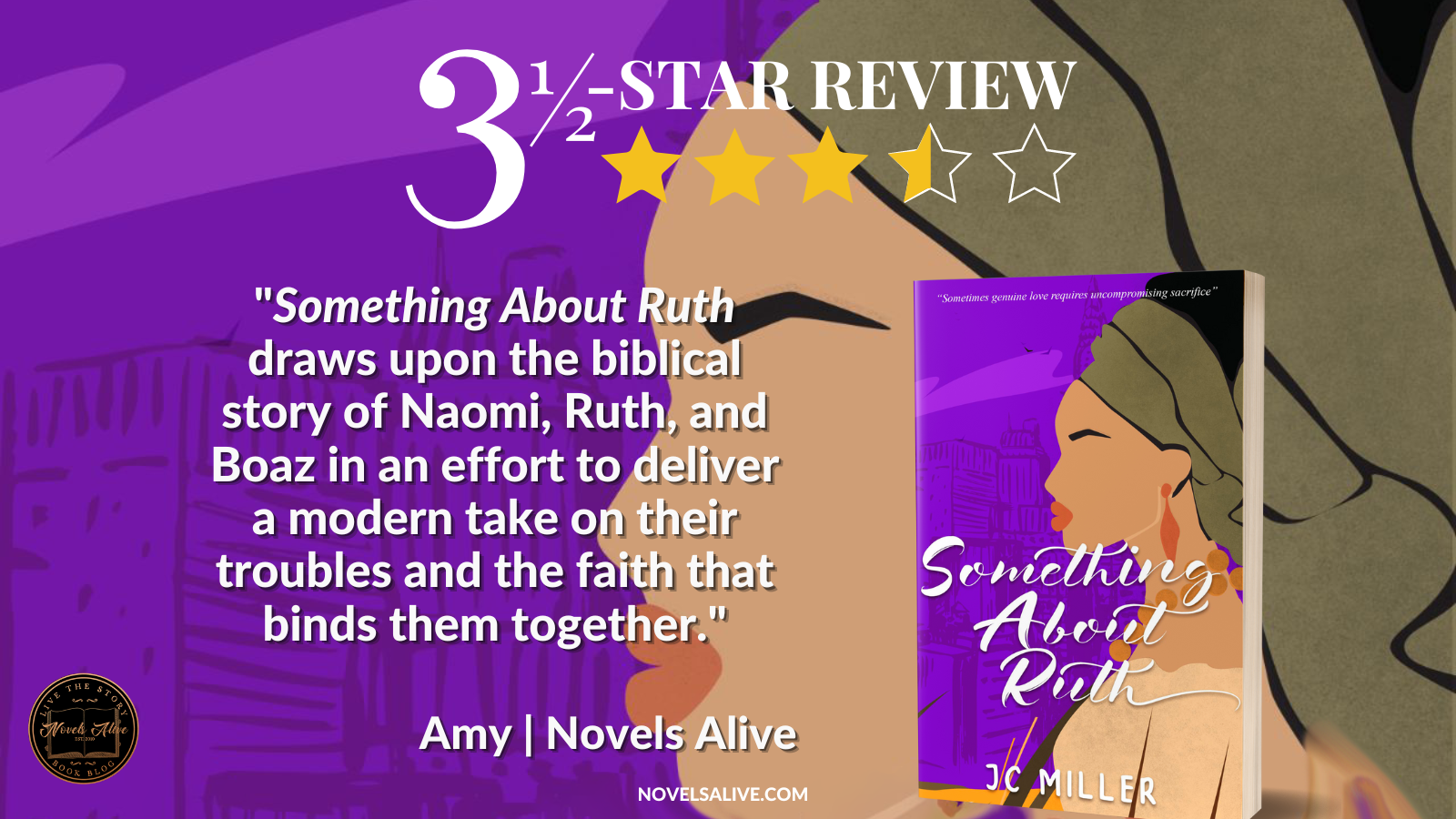

Publication Date: March 7, 2023
Sometimes genuine love requires uncompromising sacrifice.
It’s easy to make an idol of routine—finding comfort in the boundaries set before you. Something About Ruth is an intricately woven, magnificently crafted story about three ordinary strangers, who, after Katrina, are plucked from their own securities and set against unordinary circumstances. But fate brings them together.
Ruth, an outsider.
Naomi, a wounded mother.
Boaz, a no-nonsense man of character.
The path that brings them all together is scarred with the pain of loss, the bitterness of starting over, and the faith that sustains them.

In the wake of Hurricane Katrina, residents of New Orleans gathered at the Superdome in hopes of finding safety. Instead, it turned into an extended nightmare.
That event sets the stage for the opening chapter of JC Miller’s story titled Something About Ruth, which is based on a modern-day recreation of Ruth’s story from the Bible.
The challenging part for me is the dialog between the characters is written using conversational Black language pulled from the Deep South of long ago. It’s reminiscent of Mammy from Gone With the Wind.
As a result, building a rapport with the characters was an uphill battle. I certainly appreciate the skillful way the author retold the story, but I wish the authenticity had been accomplished differently.
Something About Ruth draws upon the biblical story of Naomi, Ruth, and Boaz in an effort to deliver a modern take on their troubles and the faith that binds them together.

 JC Miller is a freshly anointed, faith-based author who uses her childhood experiences in the Bronx, New York, to capture the soul of inner-city living. As a former student of Chicago’s Moody Bible Institute and a graduate of the Te’Hillah School of Urban Ministry, Miller utilizes her studies to intertwine pop culture with divine accounts of biblical characters. Through sharing these stories, her goals are to encourage people to study the bible and not make it complicated, to view themselves through the lives of those characterized, and to find healing in Christ.
JC Miller is a freshly anointed, faith-based author who uses her childhood experiences in the Bronx, New York, to capture the soul of inner-city living. As a former student of Chicago’s Moody Bible Institute and a graduate of the Te’Hillah School of Urban Ministry, Miller utilizes her studies to intertwine pop culture with divine accounts of biblical characters. Through sharing these stories, her goals are to encourage people to study the bible and not make it complicated, to view themselves through the lives of those characterized, and to find healing in Christ.
JC Miller recently co-founded a publishing company, Jess, Mo’ Books, with her childhood friend, M.R. Spain. Together, these ladies are creating fresh content to uplift, educate, and motivate women through blogs, social media groups, and a yearly online magazine.

March 7 – RABT Book Tours – Kick Off
March 8 – The Faerie Review – Spotlight
March 9 – Lisa’s Reading – Spotlight
March 10 – Writers N Author – Interview
March 13 – Our Town Book Reviews – Spotlight
March 14 – Momma and Her Stories – Excerpt
March 15 – Momma Says to Read or Not to Read – Spotlight
March 16 – Angela’s Freelance Writing – Spotlight
March 17 – Matters That Count – Excerpt
March 20 – Book Reviews by Virginia Lee – Spotlight
March 21 – Nana’s Book Reviews – Spotlight
March 22 – Novels Alive – Review
March 23 – Crossroad Reviews – Spotlight
March 24 – The Avid Reader – Interview
March 25 – Book Corner News and Reviews – Spotlight
March 27 – Book Junkiez – Spotlight
March 28 – Texas Book Nook – Review
March 29 – Sapphyria’s Book Blog – Spotlight
March 30 – Lisa Haselton – Interview
March 31 – Liliyana Shadowlyn – Spotlight
April 1 – Susan’s Book World – Spotlight
April 3 – The Indie Express – Review
April 4 – Paws. Read. Repeat – Review
April 5 – Books Blog – Spotlight
April 6 – Novel News Network – Review
April 7 – RABT Reviews – Wrap Up





















Wow! That’s a very racist remark.
To say that the language used is “reminiscent of Mammy” is at minimum archaic and tone deaf and at most extremely freaking racist. AAVE is an actual language and to judge it so harshly in such a public way is utterly ridiculous. Say the book was poorly written but to judge it because of something you didn’t understand? You may as well have just told people to build a wall around the book. Good grief. I hope you learn and do better.
This is extremely insensitive to the Black community, as it reinforces harmful and inaccurate portrayals of Black people. Saying you can’t understand is racist and it’s insensitive to compare it to “Mammy from Gone With the Wind” because it implies that AAVE is inferior. It perpetuates that white culture is the default, and any deviation from it is seen as “other” or “lesser.” “It’s time to stop being ignorant and educate yourself. Learn about AAVE and understand it is a legitimate dialect, not inferior to Standard English.